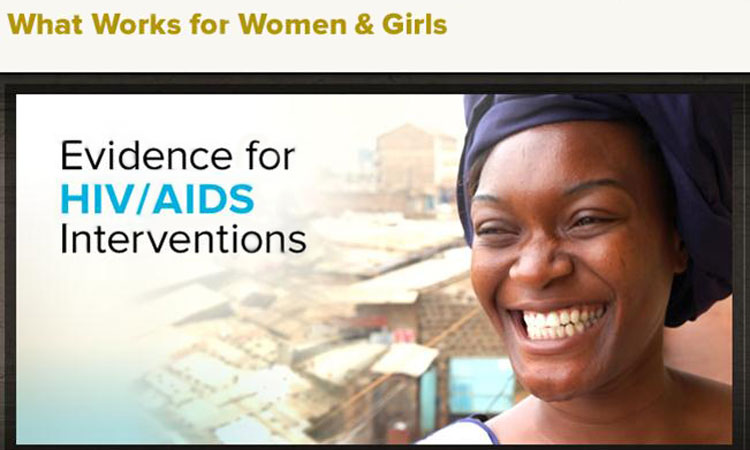The Health Policy Project ended in 2016. Work continued under Health Policy Plus (HP+) until 2022.
NEWS & VIEWS
New study highlights successful health interventions for women living with HIV
What Works to Meet the Sexual and Reproductive Health Needs of Women Living with HIV, a study recently published in the latest issue of the Journal of the International AIDS Society, indicates that existing health interventions can meet the sexual and reproductive health needs of women living with HIV. With several successful programming components already in place, the study suggests there is much that can be done now to improve the health of women living with HIV.The article was derived from What Works for Women & Girls: Evidence for HIV/AIDS Interventions, a ground-breaking, comprehensive website documenting the evidence for effective HIV interventions for women and girls. What Works for Women & Girls is supported by the U.S. President’s Emergency Plan for AIDS Relief (PEPFAR) and the Open Society Foundations and is being carried out under the auspices of USAID’s Health Policy Project and the Public Health Institute. The site is currently being updated with the latest evidence.
The study draws on 35 evaluations of eight general interventions from 15 countries and multi-country reviews. While gaps in programming and research remain, the article shows that successful and promising interventions include:
- Providing contraceptives and family planning counseling as part of HIV services;
- Ensuring early postpartum visits providing family planning and HIV information and services;
- Providing youth-friendly services;
- Supporting information and skills building;
- Supporting disclosure;
- Providing cervical cancer screening;
- Promoting condom use for dual protection against pregnancy and HIV; and
- Providing anti-retrovirals, which can increase protective behaviors including condom use.
It is also critical that both health providers and women receive the most up-to-date clinical information on the safety of family planning methods for HIV-positive women. In January 2012, the World Health Organization will review the evidence to address the questions that have arisen over the years about the safety of hormonal contraceptives for women living with HIV.
As a sexually transmitted infection, HIV is inextricably linked with sexual and reproductive health. Women living with HIV, as well as HIV-negative women, benefit from interventions that give them control over their reproductive lives and reduce unintended pregnancy, HIV transmission and mortality and morbidity. Too often, discussions of sexual and reproductive health services for women living with HIV revolve around controlling fertility and ignore HIV-positive women’s needs for services that include attention to safe and healthy sexuality and a desire for children.
Read the article here.
For more information, please visit the What Works for Women & Girls website.
What's New
- Something to Build On: “Innovation Exchange” Celebrates the Health Policy Project’s Close and a New Beginning
- What Will it Take for Tanzania to Achieve ART Targets and Ensure Long-Term Sustainability of the HIV Response?
- Helping Kenya’s County Leaders Advocate for Increased Health Investments
- HPP Holds Working Meeting on Ensuring Responsible PEPFAR Transitions for Key Populations
- Health Policy Project Celebrates 2016 International Women's Day
- HPP Staff Participate in White House Conference on HIV Stigma Reduction


